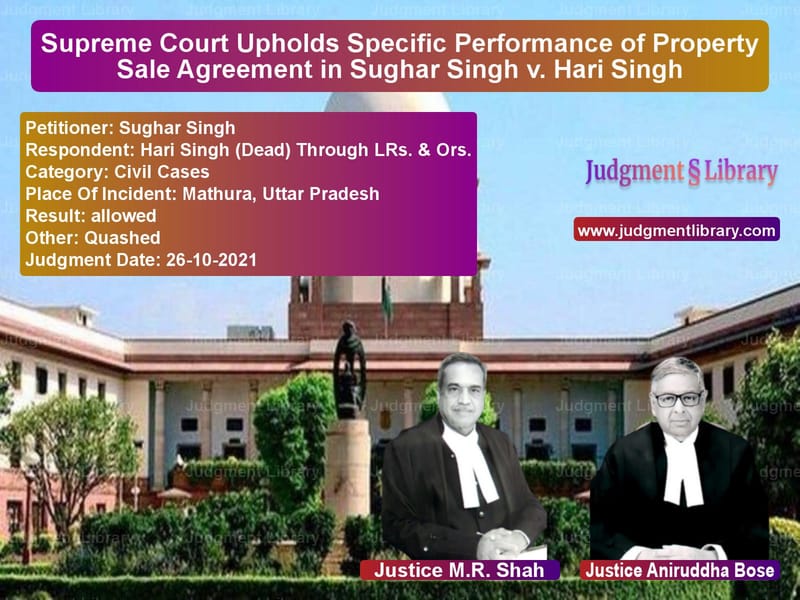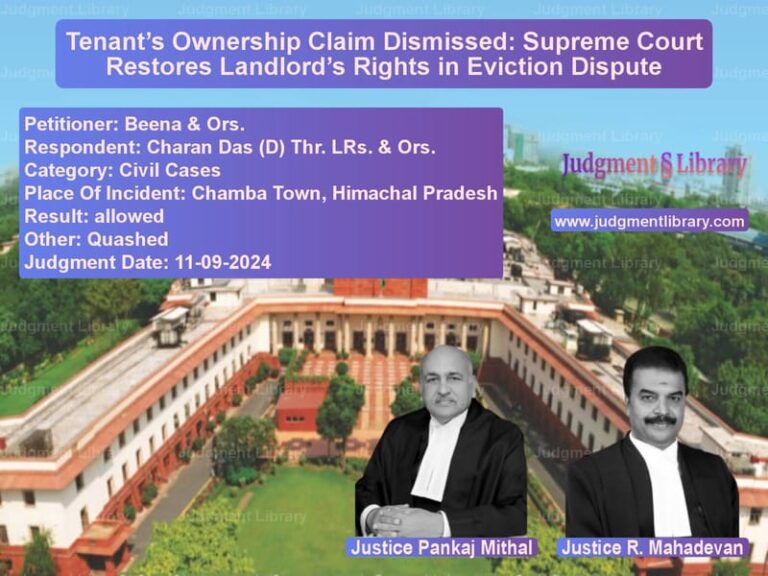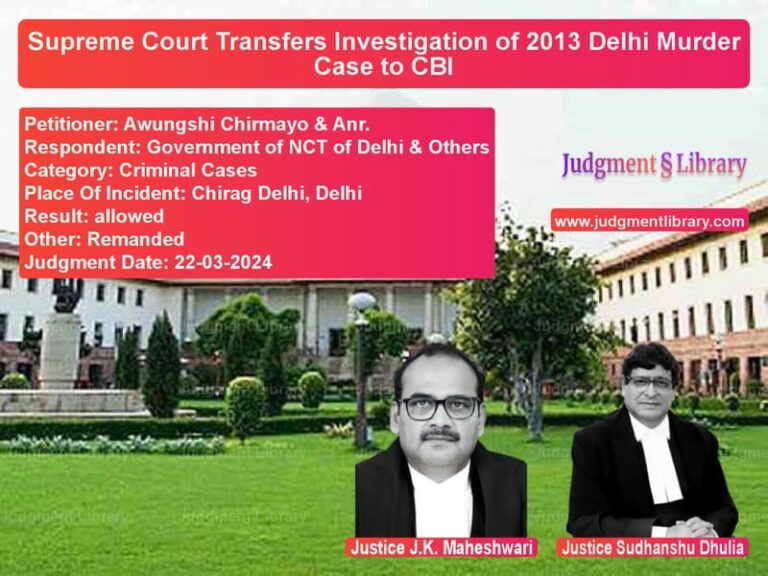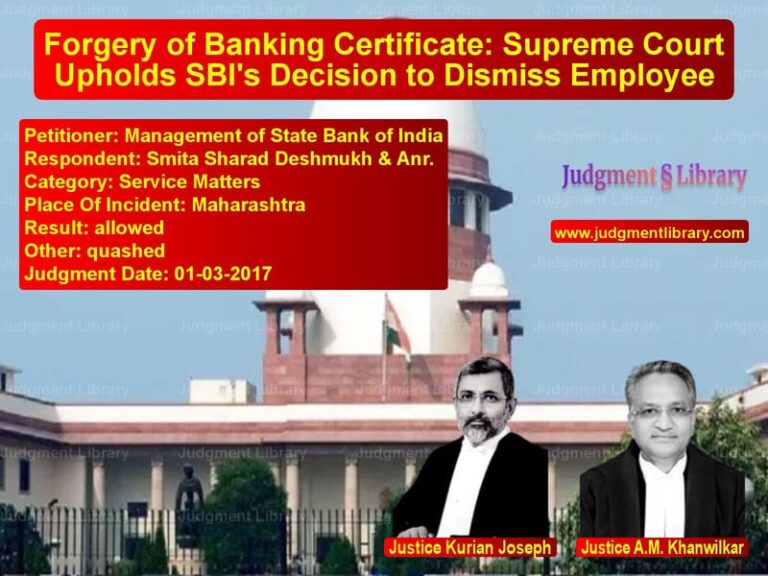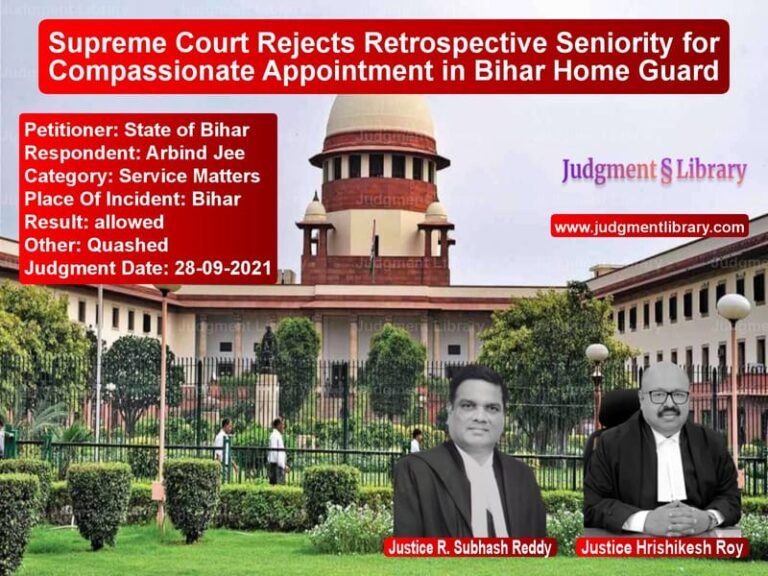Supreme Court Upholds Specific Performance of Property Sale Agreement in Sughar Singh v. Hari Singh
The Supreme Court of India recently delivered a significant ruling in Sughar Singh v. Hari Singh (Dead) Through LRs. & Ors., affirming the principle that a valid agreement to sell must be honored, and specific performance should be granted unless there are strong reasons to deny it. This case involved a protracted property dispute in which the High Court had overturned the concurrent findings of the lower courts, leading to a crucial examination of the doctrine of specific performance under the Specific Relief Act, 1963.
Background of the Case
The dispute originated from an agreement to sell executed by Ram Singh in favor of the plaintiff, Sughar Singh, regarding agricultural land in Mathura, Uttar Pradesh. The key facts of the case are as follows:
- The agreement to sell was executed on October 10, 1976, for a total sale consideration of Rs. 56,000/-.
- The vendor, Ram Singh, received Rs. 25,000/- as part payment.
- The agreement specified that the sale deed would be executed within two years.
- At the request of Ram Singh, the period was extended twice (on September 30, 1978, and September 29, 1981), and additional payments of Rs. 8,000/- and Rs. 7,000/- were made, leaving a balance of Rs. 16,000/-.
- Despite these extensions and payments, Ram Singh sold the land to his nephews (defendant nos. 2-5) on June 23, 1984, through a registered sale deed.
- Aggrieved, Sughar Singh filed a civil suit for specific performance in 1984.
Legal Issues Considered
- Whether the agreement to sell executed in favor of Sughar Singh was valid and enforceable.
- Whether Sughar Singh was ready and willing to perform his contractual obligations.
- Whether defendant nos. 2-5 were bona fide purchasers without notice of the prior agreement.
- Whether the High Court was justified in reversing the lower courts’ decisions.
Petitioner’s (Sughar Singh) Arguments
The plaintiff argued:
- The agreement was legally executed, and the vendor had received substantial part-payment.
- The extensions were executed in writing, proving mutual agreement to extend the timeline.
- He was always ready and willing to complete the sale by paying the balance amount.
- The subsequent sale to Ram Singh’s nephews was a fraudulent attempt to defeat his rights.
Respondent’s (Hari Singh’s Legal Representatives & Others) Arguments
The defendants countered:
- The agreement to sell was fabricated, and no valid extensions existed.
- The purchasers were bona fide and had no knowledge of the previous agreement.
- The plaintiff had failed to plead and prove his readiness and willingness under Section 16(c) of the Specific Relief Act.
- The relief of specific performance was discretionary under Section 20, and monetary compensation should suffice.
Supreme Court’s Observations
On the Validity of the Agreement
The Supreme Court held that the agreement was legally valid and enforceable:
“The execution of the agreement to sell and the payment of substantial consideration were proved by documentary evidence and corroborated by witness testimonies.”
On Readiness and Willingness
The Court rejected the High Court’s finding that the plaintiff failed to plead readiness and willingness:
“The plaintiff’s pleadings and conduct clearly demonstrate his intention to complete the sale. The balance of Rs. 16,000/- was to be paid at the time of execution, and he had deposited the amount in the court.”
On Bona Fide Purchaser Claim
The Supreme Court found that the subsequent purchasers were aware of the agreement:
“Defendant nos. 2-5 had full knowledge of the prior agreement and cannot claim to be bona fide purchasers.”
On Discretionary Relief Under Section 20
The Court clarified that specific performance is not an automatic relief but should generally be granted unless inequitable:
“To deny specific performance when all conditions are met would reward dishonest behavior and encourage breaches of contract.”
Final Judgment
The Supreme Court ruled:
- The High Court’s judgment was quashed.
- The trial court’s decree for specific performance was restored.
- The legal representatives of Ram Singh and defendant nos. 2-5 were directed to execute the sale deed in favor of Sughar Singh within four weeks.
- The plaintiff was entitled to take possession of the land.
Significance of the Judgment
- Reinforces Contractual Sanctity: Strengthens the principle that legally executed agreements must be honored.
- Protects Genuine Buyers: Ensures that subsequent purchasers cannot claim ignorance to defeat prior agreements.
- Clarifies Readiness & Willingness: Confirms that substantial payments and good-faith efforts fulfill Section 16(c) requirements.
- Limits Judicial Overreach: Ensures that appellate courts do not interfere with concurrent factual findings without strong justification.
Conclusion
The Supreme Court’s ruling in Sughar Singh v. Hari Singh is a landmark decision affirming the enforceability of sale agreements and limiting judicial interference in well-established contractual disputes. By restoring the trial court’s decree, the judgment protects buyers from fraudulent transactions and strengthens faith in the legal process.
Petitioner Name: Sughar Singh.Respondent Name: Hari Singh (Dead) Through LRs. & Ors..Judgment By: Justice M.R. Shah, Justice Aniruddha Bose.Place Of Incident: Mathura, Uttar Pradesh.Judgment Date: 26-10-2021.
Don’t miss out on the full details! Download the complete judgment in PDF format below and gain valuable insights instantly!
Download Judgment: sughar-singh-vs-hari-singh-(dead)-th-supreme-court-of-india-judgment-dated-26-10-2021.pdf
Directly Download Judgment: Directly download this Judgment
See all petitions in Property Disputes
See all petitions in Specific Performance
See all petitions in Damages and Compensation
See all petitions in Judgment by Mukeshkumar Rasikbhai Shah
See all petitions in Judgment by Aniruddha Bose
See all petitions in allowed
See all petitions in Quashed
See all petitions in supreme court of India judgments October 2021
See all petitions in 2021 judgments
See all posts in Civil Cases Category
See all allowed petitions in Civil Cases Category
See all Dismissed petitions in Civil Cases Category
See all partially allowed petitions in Civil Cases Category

